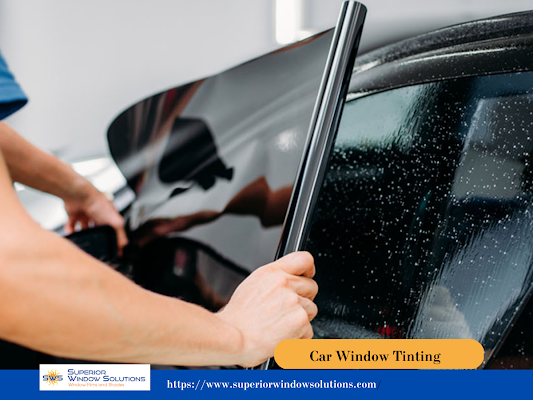Car window tinting is a popular way to improve your vehicle’s privacy, comfort, and safety. Tinting your car windows can block harmful UV rays, reduce heat and glare, and add a touch of style to your vehicle. However, choosing the right one for your needs can be challenging with so many different car window tints. This guide will look at the different types of car window tints, their unique properties and benefits, and how to choose the right one for your vehicle. Whether you are interested in improving your driving experience or enhancing your car’s appearance, this guide will provide the information you need to make an informed decision about car window tinting.
What Is Car Window Tint
Car window tinting is a popular car customization process that involves adding a thin, transparent film to the windows of a vehicle. The film is made of a material that blocks a certain amount of light and heat from entering the car through the windows. Tinting can be applied to any or all of the windows on a vehicle, including the windshield, side windows, and back windows.
When considering car window tinting, it’s important to remember that different states have different laws regarding the level of tinting allowed on vehicles. In some states, heavily-tinted windows may be illegal, while in others, there may be restrictions on the tinting level permitted on certain windows, such as the windshield.
Choosing a reputable professional to apply the tinting film is also important. A poorly-applied film can bubble or peel, which can be unsightly and may even obstruct the driver’s vision.
Benefits of Car Window Tinting
Car window tinting provides several benefits to both the driver and passengers of a vehicle. Here are some of the key benefits of car window tinting:
- Increased privacy: One of the primary benefits of car window tinting is increased privacy. Tinted windows make it more difficult for people outside the car to see inside, which can provide a greater sense of security and privacy for the occupants of the vehicle.
- Reduced glare: Tinted windows can also reduce glare from the sun, improving visibility and reducing eye strain while driving. This is especially important for drivers who spend much time on the road, as excessive glare can be a safety hazard.
- Improved comfort: Tinted windows can help regulate the temperature inside the car by reducing the amount of heat that enters through the windows. This can help keep the vehicle’s interior cooler and more comfortable, especially during the hot summer.
- UV protection: Car window tinting can block up to 99% of the sun’s harmful UV rays, which can cause damage to the skin and eyes over time. This can be especially important for people who spend a lot of time in their car, such as commuters or long-distance drivers.
- Enhanced safety: Tinted windows can also enhance safety by providing an additional layer of protection against the broken glass in the event of an accident. The film used in car window tinting is designed to hold shattered glass together, which can prevent it from flying around the interior of the car and potentially causing injury.
- Improved aesthetics: Finally, car window tinting can enhance the overall look of a vehicle by providing a sleek, modern appearance. Several types of tinting film are available, ranging from lightly-tinted films that provide a subtle change in appearance to darker films that provide a more dramatic effect.
Different Types of Car Window Tints
Several different types of car window tints are available, each with unique properties and benefits. Here are some of the most common types of car window tints:
- Dyed window tint: Dyed window tint is the most affordable option, and it works by blocking light and heat through a layer of dye. This type of tint is available in various shades, from light to dark, and can provide a sleek, stylish appearance.
- Metalized window tint: Metalized window tint uses tiny metallic particles to block heat and light, providing a more effective barrier against UV rays and heat than dyed window tint. This type of tint is also available in various shades, from light to dark.
- Ceramic window tint: Ceramic window tint is made from non-conductive ceramic particles, which can provide superior heat rejection and UV protection. This type of tint is more expensive than dyed or metalized, but it provides better performance and longevity.
- Carbon window tint: Carbon window tint is similar to ceramic tint because it uses non-conductive particles to block heat and UV rays. However, carbon tint is more affordable than ceramic and provides a sleek, matte appearance.
- Crystalline window tint: Crystalline window tint is a premium option that uses multi-layer optical film technology to provide superior heat rejection and UV protection. This type of tint is nearly clear, providing a sleek, natural appearance.
Factors to Consider Before Tinting Your Car Windows
Tinting car windows can provide many benefits, including improved privacy, reduced heat and glare, and enhanced safety. However, before you decide to tint your car windows, there are several factors you should consider to ensure that you choose the right type of tint and installation. Here are some factors to keep in mind:
- State Laws: The first thing to consider is your state’s laws regarding car window tinting. Each state has regulations on how much tint is allowed on each window, and it’s important to ensure that you comply with these laws to avoid potential fines or legal issues.
- Type of Tint: Several types of car window tints are available, each with unique properties and benefits. Consider factors such as your budget, the level of UV protection and heat rejection you need, and the appearance you prefer when choosing a tint.
- Quality of Installation: Choosing a professional and experienced installer who uses high-quality materials is important to ensure a quality installation. Poorly installed tints can peel, bubble, or crack over time, detracting from the appearance of your car and reducing the tint’s effectiveness.
- Warranty: Choose a tinting installer with a warranty on their work and materials. This can give you peace of mind knowing that you can have any issues with the tinting addressed if they arise.
- Maintenance: Once you have tinted your car windows, it’s important to maintain them properly to ensure they last as long as possible. Follow any care instructions provided by the installer, and avoid using harsh chemicals or abrasive materials that can damage the tint.
How to Choose the Right Professional Car Window Tint Installer
Choosing the right professional car window tint installer is essential for ensuring a quality tinting job that lasts for years to come. Here are some tips on how to choose the right installer:
- Look for Experience: Look for an installer with years of experience in car window tinting. Experienced installers will be able to provide expert advice on the best type of tint for your car and have the necessary skills to install it properly.
- Check Reviews: Check reviews and ratings of the installer online to get an idea of their reputation and level of customer satisfaction. You can also ask for referrals from friends or family members who have had their car windows tinted.
- Ask About Tint Options: The right installer will be able to explain the different types of tint options available and recommend the one that best suits your needs and budget. They should also be able to provide samples so you can see the different shades and textures of the tint.
- Request a Quote: Get a quote from the installer before committing to the job. A reputable installer can provide a detailed quote that includes the cost of the tint, labor, and any other materials required for the job.
- Check for Certification: Look for an installer certified by a reputable organization such as the International Window Film Association (IWFA). Certification ensures that the installer has completed training and is up to date on the latest techniques and technology in the industry.
- Ask About Warranty: The right installer will offer a warranty on their work and the materials used. Make sure to ask about the warranty and what it covers before committing to the job.
Conclusion
In conclusion, car window tinting is an excellent investment with many benefits, from increased privacy and security to improved comfort and style. By understanding the different types of car window tints and their unique properties and benefits, you can decide on the type of tint that best suits your needs and budget. Superior Window Solutions offers a wide range of high-quality car window tints and professional installation services to ensure a perfect fit and long-lasting performance. Their team of experts is always available to help you choose the right tint for your vehicle and answer any questions. Contact them today to learn more about their car window tinting services and take the first step towards enjoying the benefits of tinted windows.


